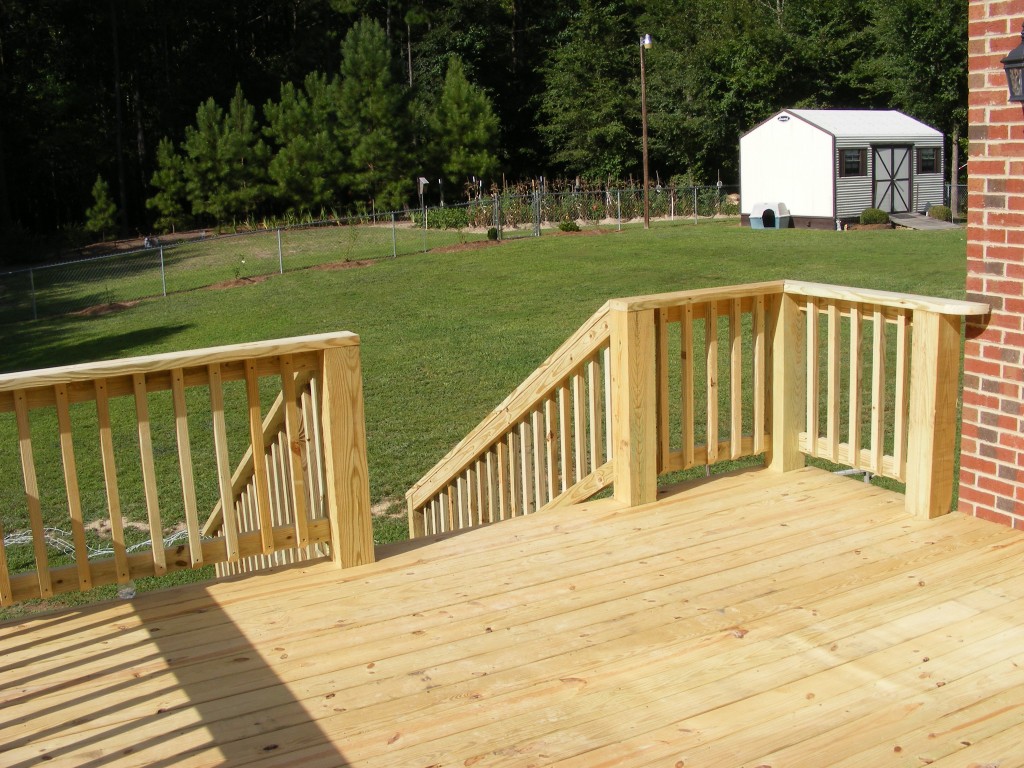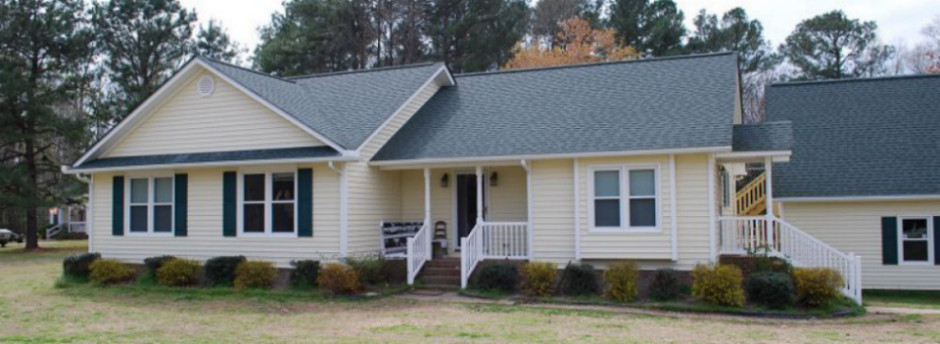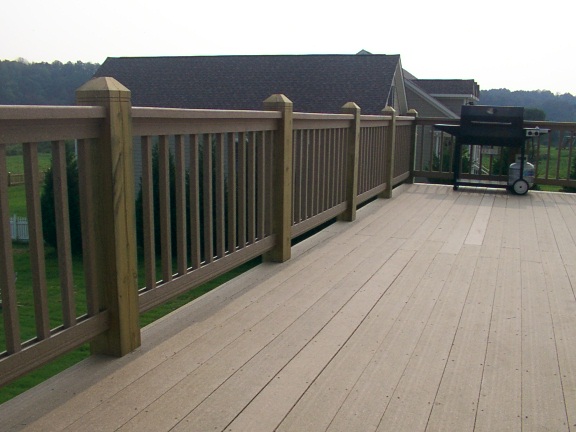
Safety first
Before using any equipment to power wash your home make sure you are familiar with it’s safe operation. Read all warning labels on both equipment and cleaning solutions. Wear protective clothing along with appropriate eye and hearing protection.
What decks must endure
We all enjoy spending time outdoors and much of that time is spent on the deck. Used for grilling, dining, entertaining or just relaxing, a deck serves as an outdoor version of many rooms inside the house. However, in contrast to inside rooms, a deck is completely exposed to the elements. Rain and snow endlessly saturate and swell the wood fibers, just as the sun endlessly dries and bombards them with damaging UV rays. Freezing temperatures can change moisture in or on a deck into ice. As the ice expands it may threaten the integrity of fasteners as well as the wood itself. Additionally, moisture combined with shady conditions contribute to the growth of mildew or other fungi. Finally, fallen leaves and sap from trees can leave stains that detract from a deck’s appearance.
Why wood is treated
The purpose of treating wood is to create an environment in and on the wood where the micro-organisms responsible for wood decay can’t survive. In addition, it makes the wood unpalatable to termites and most other wood destroying insects. Without these preservatives your deck would decay and be devoured by insects just like a log in the forest. The wood in older decks was treated with Chromated Copper Arsenate. Now decks are treated with varieties of Alkaline Copper Quat as well as Sodium Borate and Zinc Borate preservatives. Newer treatment methods, although more environmentally friendly, are less durable. Subsequently, this makes proper deck maintenance more important than ever.
Understanding deck maintenance
Usually it’s a lack of maintenance that causes problems on homes. Ironically one reasons for deck deterioration is too much maintenance. With the best of intentions many home owners subject their deck to brutal assaults with a pressure washer ever year. Understanding the process of how the wood in your deck was pressure treated may reduce the chance of damaging it during cleaning.
Do no harm
Improper use of a pressure washer can contribute to loss of the vital preservatives in treated wood. Pressure washers are often used at too high pressure for treated decks. Consequently, in addition to washing away the dirt and stains they also blast away the preservatives that are the life blood of a deck. It is possible however to power wash a deck without causing any harm.
Cleaning your pressure treated deck
The right cleaning agents along with some patience can achieve great results without the damage of high pressure cleaning. First, wet down the entire deck with clear water from a hose. Alternatively, use a pressure washer with a low pressure fan nozzle. Then, using a pump up sprayer or siphon attachment apply a commercially available deck cleaner or liquid laundry detergent to the entire deck. Additionally, bleach or some other mildewcide may be used on areas with heavy stains. Next, let the cleaner work for about 10 to 15 minuets. A quick scrub with a soft bristle brush should loosen any difficult stains. Finally, rinse with a hose or pressure washer using a low pressure fan tip. Never let the tip get closer than about 12” to the deck. Repeat the process as needed to remove stubborn stains. After that, be sure to rinse nearby surfaces and plants thoroughly.
Cleaning agents
There are many premixed as well as concentrated deck cleaners, deck bleachers and mildewcieds available. Follow label instructions for applying prepackaged cleaners. Alternatively, make your own cleaner by mixing two or three ounces of liquid laundry or dish, detergent per gallon of water. If mildew is apparent, add up to 6 ounces of bleach along with the detergent.
Environmental precautions
Avoid damaging plants around your deck by wetting them down with clear water prior to using any deck cleaners. Rinse over-spray off nearby plants while the cleaner is working and after the deck cleaning is completed. Rinse surfaces adjacent to the deck before and after cleaning. Finally, empty all containers that may hold contaminated water to prevent accidental exposure to children or pets.
Summary
This method will allow you to power wash and clean your deck without washing away the preservatives that protect it. Check out evolution of treated decks for more insights on how decks have changed. Read staining decks and deck sealant for tips on keeping you deck looking good longer.
Check back for more maintenance tips and visit our website Gallery page to see photos of our work.
Remember Wood’s Home Maintenance Service provides a complete line of maintenance, repair, and building services





Great post with good information. If you need a good pressure washer check out powerblast.com.au
This is so informative. Glad I was able to find this article.
I really appreciate your work. Please keep sharing such great stuff in the future.
Maintaining a deck may seem like a daunting task, but with proper knowledge and care, it can be a simple and rewarding process. As the article suggests, using a power washer on a deck can be harmful if not done correctly, which is why understanding the process of how the wood was treated is crucial. Fortunately, there are many cleaning agents available that can effectively remove dirt and stains without damaging the wood or harming nearby plants. So, next time you’re out enjoying your deck, take some time to give it the care it deserves and keep it looking great for years to come!